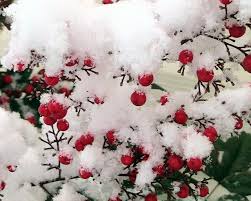Growing Plants In The Winter

For many of us, the approaching winter months can put a damper on spending time in our gardens, the good news however is we can still do what we love even during the winter months by extending the season with these garden tips that are simple but have proven to give good results.
No matter which garden project you are planning you can still work the soil during the cold months, the key to having success is proper planning once this is in place you are well on your way to reaping a good harvest even during this time of the year.
Where to locate your winter garden?
The first step in the right direction is location, the chilly weather along with the winter breeze can have an adverse effect on garden plants so seek out an area on the south side of your home. Another great place is underneath your deck which will provide your plants with enough shade to thrive, cold frame gardens are so popular and are also great when growing a winter garden.
Cleaning your winter garden
If the area chosen needs some sprucing up then go ahead before installing your garden by removing large stones, cans, paper, weeds, etc.
Winter garden soil type
If soil is needed then add soil at this time, level the area that’s to be planted with the back of a hard rake or a rake that’s designed for leaf cleanup is just as good. Garden soil is a key component in the life of plants therefore ensure that the soil you are using is ideal for your plant type. Lightly rake the soil getting it as level as possible, this will not only give that neat appearance but will make the soil easier to work when installing your plants.
Plants that grow in cold climates
Vegetables
- Turnips
- Radishes
- Cabbage
- Kale
- Beets
- Spinach
- Collards
- Potatoes
- Swiss chard
- Cauliflower
- Broccoli
- Kohlrabi
- Leeks
- Fava Beans
Best fruits to grow in the winter
- Cherries
- Apples
- Crabapples
- Raspberries
- Pomegranates
- Citrus
- Persimmons
- Plums
- Pears
Ornamental plants for cold weather garden
- Pansies
- Dusty miller
- Catmint
- Hostas
- Geranium
- Coral bells
- Aster
- Dianthus
- Petunia
- Violas
- Chrysanthemum
- Purple coneflower
- Oregon grape
Mulching your winter garden plants

During the winter months, the soil needs to stay warm to protect the plant’s roots from freezing and for soil microbes to remain active in the soil. Garden soils are very much alive with soil microbes that are hard at work to ensure that our garden plants are provided with nutrients by continuing to break down organic matter.
To protect plant roots and soil microbes insulate the soil with materials such as straw, bark chips, hay, pine boughs, shredded bark, pine needle, shredded leaves, etc… applying a 2 to 3-inch layer of mulch is ideal.
Watering methods for your winter garden
During the winter months, you will not need to water as much, before applying water check the soil for moisture. To check your soil moisture level stick your finger 1-2 inches into the soil or you can purchase a soil probe or soil moisture meter from your garden center or plant nursery that can also give you an accurate reading. Also, the use of room temperature water is safer than cold water which can send your plant into shock.
Should I fertilize my winter garden?
Fertilizing during the winter months is optional, I prefer not to fertilize during the cold season because during this time of the year garden plants are not actively growing. On the other hand, some person’s reasons for not fertilizing is to avoid new growth from emerging that can be winter-killed.
Are garden insect pests active during the winter months
Garden insect pests are most active during the warmer seasons, summer through spring, once the cold weather arrives, most insects go dormant overwintering in the soil or leaf litter, and emerges with the arrival of spring. Therefore there is no need of being concern with applying pesticides at this time.
Winter garden maintenance chores
Because nature comes to almost a standstill during this time of the year maintaining a winter garden is easier. There is not much watering that is required except for light raking, the removal of disease plants if needed or disease plant parts, removing invasive weeds as needed, doing light pruning as the need arises, replenish mulch, amending your soil for spring, dividing and planting bulbs if this is a plant of your choice, clean and sharpening of tools for the coming spring and summer months.
Container gardening in the winter
If you’re planning on moving your garden to the indoors then growing plants from containers can work as well, when growing plants indoors seek out an area that gets the most sunlight such as a south or west-facing window. If there’s a challenge with getting sunlight indoors then Installing grow lights can work as well, avoid placing plants too close to windows because of drafts which can bring that winter chill, once your plants have been placed continue to water but remember as we said earlier before adding water check the moisture level. Most indoor plants die from overwatering because of root rot.
Keeping an eye on room temperatures is so important, know the temperature that your plants can thrive indoors during the cold months. This information can be retrieved from your nurseryman but as a rule, ensure that the room temperature is around 55-85 Fahrenheit. This is not a set rule because different plant types require different temperatures. A humidifier can help in keeping the inside air from getting dry, these devices will help in keeping the air moist. Keeping your plants away from heat sources such as electronic devices, ovens, fireplaces, and radiators is also a must because the heat will dry the air which is not good for indoor plants.
Grouping indoor plants together or bringing them closer can increase the humidity around them, another popular method that has proven to be effective is placing your plant pots on top of a pebble tray that’s filled with water, this will increase humidity, a word of caution, however, don’t allow your plants to sit in the water for too long and change it regularly so the water doesn’t become stagnant.
House plant pests in the winter
Indoor temperatures may encourage some uninvited guests (garden insect pests) mealybugs, spider mites, fungus gnats, etc.. keep an eye out for them. Appling a lite solution of soap and water or insecticidal soap will offer help.
The final word on how do you make a winter garden
These proven methods will have you working the soil even during the colder months, why should you have to give up what you love doing when you can work the soil and extend the season with these helpful tips. The winter months provide many opportunities to get creative so don’t let this time of the year hinder you. Remember proper planning is the key so let’s get started as we garden all winter long.
About the author
Norman loves being in the garden, both at home and for his job....
he is 'Natures Little helper' being outdoors, growing his vegetables and flowers from an early age.
Now having spent over 22 years in the profession he want to give some of his knowledge to others...
his vast array of hints and tips you will find scattered over this site will help you no end growing plants in your garden.

It’s surprising how many different plants can be grown during the winter. I’ve seen dwarf varieties of fruit trees that will grow in a container being sold in various places.These include apple trees, cherry trees, and peach trees. Might these trees be suitable for growing indoors during the winter?
It is amazing that even during the winter months you can extend the season of growing garden plants, it is possible to grow these trees indoors during the winter months as long as you meet their requirements I prefer however to go with the dwarf varieties. Hope this helps.
Hi Norman. Thank you for very interesting article. I love my garden and Im spending lot of time there but I never thought that winter is also good time for growing plants. But looking on your post its definitely missed opportunity and there are many different types of plants and vegetables perfect for cold weather. Looking forward to use your advices in practice.
Hello Cogito. I am so happy to help, why stop what we love doing just because of the winter months. We can still work the soil and extend the season true proper planning. Wishing you all the best in your garden as you extend the season with these helpful tips.